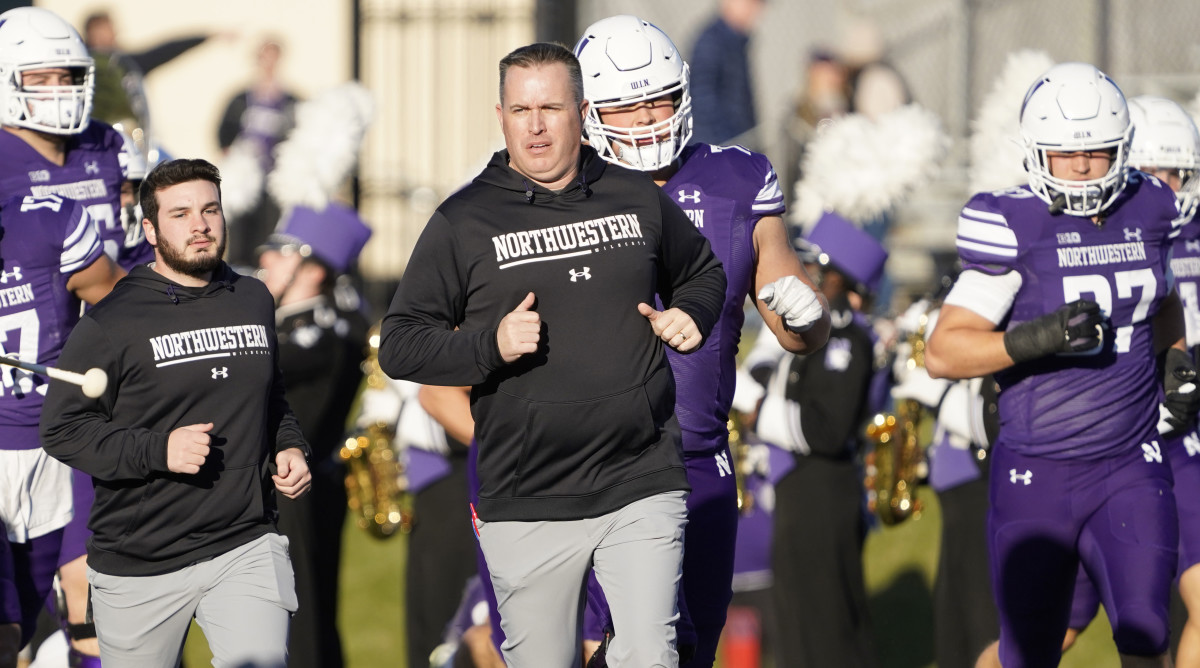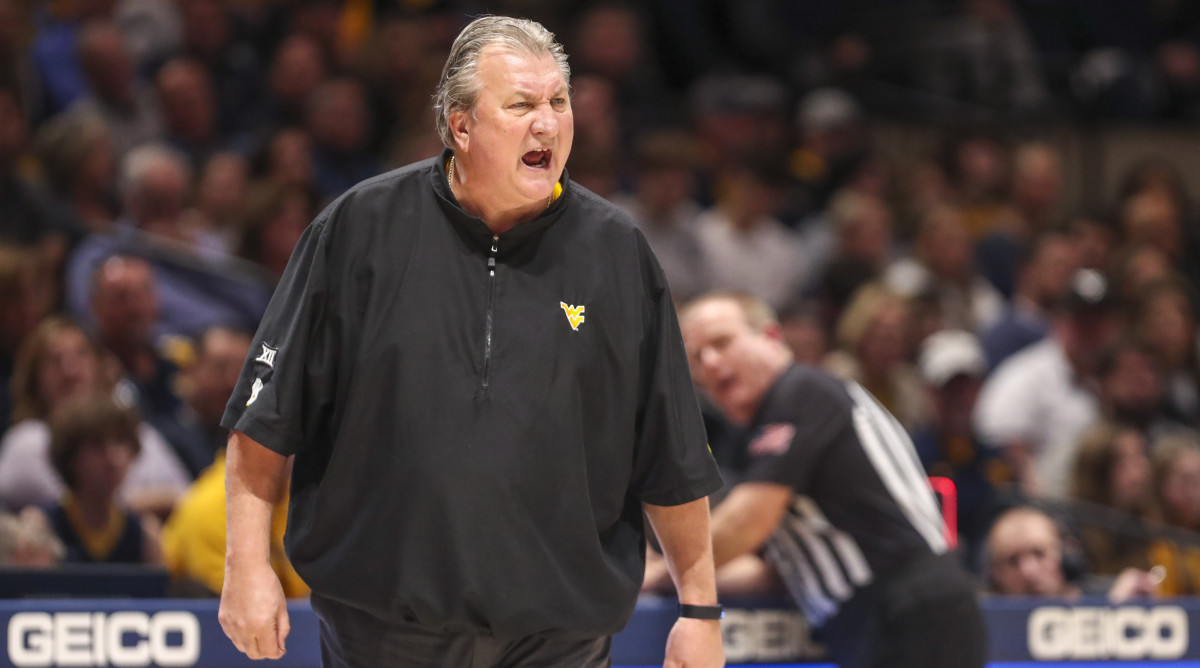Fitzgerald, Huggins Controversies Reveal Complex Power Struggles at the Highest Level

The ultimate athletic scenario for a university president is to have a successful coach who is an alum of the school and will stay there for the long haul, winning big while declining overtures elsewhere. That dream scenario takes a problematic twist when controversies arise and a power struggle ensues.
Presidents Gordon Gee of West Virginia and Michael Schill of Northwestern have been living through the problematic twist segment of the job. Gee is dealing with a truly obnoxious power play from former men’s basketball coach Bob Huggins, while Schill is trying to navigate a freshly public hazing scandal in Pat Fitzgerald’s football program.
The details of Schill’s situation came to light over the weekend, thanks largely to some strong reporting by the Daily Northwestern student newspaper. The paper, via two anonymous players, detailed disturbing allegations of ritual hazing of freshmen by upperclassmen. The hazing was said to be sexual in nature and described as an ingrained tradition within the program. “It’s just absolutely egregious and vile and inhumane behavior,” one of the anonymous players told the Daily.
The player who was the primary source for the story described upperclassmen performing a certain hand-clapping gesture known on the team as a “Shrek clap,” that signified which player was to be hazed. The player believes it’s likely that Fitzgerald knew what was transpiring. Even if he didn’t, program responsibility lands on Fitz’s desk, and has for nearly two decades.
An open letter to various media outlets later Saturday pushed back on the Daily’s story. It was signed by “the ENTIRE Northwestern football team,” but it’s also conceivable that it was orchestrated by Fitzgerald, his staff or his supporters. The letter asserted that the allegations of hazing were “exaggerated and twisted,” and said Fitzgerald had no knowledge of any incidents that occurred. But an independent investigation had already verified major problems.

Northwestern received hazing complaints in 2022 and hired an independent law firm to investigate. The lead investigator concluded that the hazing claims were “largely supported by evidence” and that there was “widespread” participation in, or knowledge of, hazing activities by players. The school announced Friday that Fitzgerald was being suspended two weeks without pay.
The school seemed to figure the details of what the investigation uncovered would never come to light. When they did via the student newspaper, Schill made a backtracking statement late Saturday, indicating that Fitzgerald could face more significant sanctions: “In determining an appropriate penalty for the head coach, I focused too much on what the report concluded he didn’t know and not enough on what he should have known. As the head coach of one of our athletics programs, Coach Fitzgerald is not only responsible for what happens within the program but also must take great care to uphold our institutional commitment to the student experience and our priority to ensure all students—undergraduate and graduate—can thrive during their time at Northwestern. Clearly, he failed to uphold that commitment, and I failed to sufficiently consider that failure in levying a sanction.”
In other words, this could and probably should get worse for Fitzgerald. We’ll see how much worse, and how hard Fitz fights back. The proud Chicago South Sider and former star linebacker has been weaved into the fabric of Northwestern since the early 1990s, while Schill has been president for less than a year after arriving from Oregon. This is a tricky political dance for Schill, but also a very bad look for Fitz’s football program.
The word “hazing” sends college administrators into cold sweats; it’s an archaic campus ritual that has led to major consequences in recent years for fraternities, athletic teams and the leaders of those organizations. It’s also a criminal offense in Illinois. This is serious stuff.
Fitzgerald has turned down overtures for other jobs multiple times during his 17 years as head coach of the Wildcats. His 110 victories are by far the most in the school’s modest football history, and he is the only Northwestern coach of the last 60 years with a winning overall record. Taking the program to the Big Ten championship game twice in five years established a new level of credibility.
But Fitz is also coming off consecutive seasons of 3-9 and 1-11, balancing the scales of loyalty. He stuck by Northwestern when he could have left, and the university has stuck by him during a significant downturn.
It would be easier to for Schill to fire Fitzgerald after a 4-20 run than two winning seasons—but wins and losses don’t resonate the same way at Northwestern as the rest of its Big Ten brethren. Northwestern is a different place, and understandably protective of its elite academic reputation. The endgame here is not easy to foresee and will leave many people unhappy regardless.
College sports being what it is—a place where multiple elite-level chances are given to the likes of Hugh Freeze, Rick Pitino, Will Wade and Chris Beard—Fitzgerald would be a hot commodity on the open market. He’s only 48 years old, and if he’s available before this season starts he could precipitate a “Fire For Fitz” September surge as programs jockey to hire him. Regardless, it would be a jarring turn of events to see a guy who had a virtual “Coach For Life” tag suddenly available.
The presidential dilemma is significantly less pronounced in Morgantown, where Huggins seems intent on napalming what’s left of his image and ties to the school. Having been pushed into resigning last month after two egregious episodes—an ugly DUI charge in Pittsburgh following offensive, anti-LGBTQ commentary on a radio show—the Hall of Famer is not going quietly or gracefully.

His attorney sent notice July 7 to Gee brazenly stating, “The purpose of this letter is to update WVU on Coach Huggins’ current status and to plan for his return to active duties as Head Basketball Coach.” The letter goes on to say that Huggins did not actually resign, and intends to sue the school if not reinstated.
This is an interesting approach, given the publicly released statement last month from WVU attributed to Huggins that said he submitted a letter to Gee and athletic director Wren Baker “informing them of my resignation and intent to retire. …” Even if there was some element of miscommunication, Huggins was richly deserving of a firing after embarrassing the school where he played and coached.
Still, there have been rumblings that boosters and Huggins were plotting a return after sitting out the 2023-24 season, in which the Mountaineers will be led by an interim coach. This dramatically accelerates the potential timetable on that power play, not to mention the contentiousness of it. It isn’t going to work.
This is off-putting in the extreme, a tone-deaf gambit by an emperor-coach who clearly hasn’t accepted responsibility for his actions. It sheds further light on the enabling culture that clearly has surrounded Huggins—this isn’t just his daughter issuing a denial-laden social media post about her father being railroaded; this is a legal threat directed at the school’s leadership.
In terms of dealing with a beloved coach who is suddenly plunged into controversy, it’s better today to be Gee than Schill. But neither situation is easy. In a college athletics culture that rewards winners with more money and clout than their bosses, it’s sometimes hard to tell who is really in charge.
